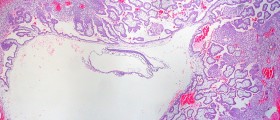
PID is essentially an inflammation of the reproductive organs, something that can be caused by chlamydia. The uterus and fallopian tubes are most commonly affected and the possible symptoms of Pelvic Inflammatory Disease include pelvic pain, bleeding, fever, and abscess development. Having chlamydia does not automatically mean that you have PID too, and when discovered in the early stages, chlamydia is easily treated with antibiotics. Once you have had an initial bout of PID, you are more likely to develop a tubal pregnancy as scars formed in the fallopian tubes, making it more difficult for the fertilized egg to move down into the uterus.
Chlamydia is a bacterial infection, and as the infection spread around the reproductive organs, it damages healthy tissue and leaves scar tissue behind instead. Sometimes, this can disrupt the ability of the egg to move down to the uterus, and sometimes the fallopian tubes are scarred to the extent that they are completely blocked. Depending on the level of damage, PID can make an ectopic pregnancy more likely, to pretty much inevitable. The chances that irreparable damage will be done to a woman's fallopian tubes increase depending on the amount of time the underlying infection chlamydia, or sometimes gonorrhea is able to run free. That is why reproductive health is so important, and why everyone should go for routine health check ups. Sexually transmitted diseases can strike you even if you are monogamous (and think your partner is, too), and they often have no symptoms at all.
- www.cdc.gov/std/pid/stdfact-pid.htm
- www.cdc.gov/std/pid/stdfact-pid-detailed.htm
- Photo courtesy of Eduardo Garcia Cruz by Flickr: www.flickr.com/photos/128511347@N05/15758733175/

















Your thoughts on this
Loading...